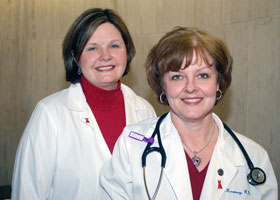  |
| HOME | THIS ISSUE | CALENDAR | PATENTS | BACK ISSUES | < BACK | NEXT > |
Dedicated team always there for patients with heart failureby Maureen McGuire - February 26, 2007 | ||||
| From the time Manny Cerruto was first diagnosed with heart failure nearly 20 years ago, he and his wife have spent many hours with the Health Center’s Heart Failure Program, both in person and by phone. “They have always pulled me through – they are going to keep me going for another 20 years,” says Cerruto, 76. Like many patients with heart failure, Cerruto takes a complex regimen of multiple medications and has undergone numerous hospitalizations and procedures, including open heart surgery, angioplasty, and the implantation of a pacemaker. His condition can fluctuate frequently and rapidly. When he and his wife have questions, they know they will get an immediate response from the UConn team. “We can call any time and they are always there for us. They are always looking for ways to help us,” says Donna Cerruto, his wife. Calhoun Cardiology Center It includes cardiologist Dr. W. David Hager, director; nurse practitioner Marybeth Barry, co-director; and nurse Laura Kearney. The team is supported by cardiologists Drs. Michael Fucci and Mathias Stoenescu. The team started in the mid-1980s in an attempt to treat heart failure patients more aggressively in the outpatient setting, and to reduce the number of hospital readmissions. The team approach, they surmised, would provide more complete care for patients, and help to address problems before hospitalizations were necessary. That approach, according to both medical staff and patients, has been successful. UConn’s initiative was the first formal heart failure program in Connecticut. The team manages hundreds of patients, many of whom are participating in clinical research trials, which have always been pivotal to the program. What is heart failure? By its simplest definition, heart failure means the heart isn’t pumping blood as well as it should to the rest of the body. As a result, symptoms include shortness of breath, swelling, and fatigue. There are two types of heart failure. The distinctions are important, because the drug treatments for each condition are different. Systolic failure occurs if the left ventricle loses its ability to contract normally and the heart can’t pump with enough force to push sufficient blood into circulation. Diastolic failure occurs if the ventricle loses its ability to relax normally because the muscle has become stiff and the heart can’t properly fill with blood during the resting period between each beat. Heart failure usually develops over time and often coincides with other conditions such as coronary artery disease, diabetes, and high blood pressure. More than half of patients with heart failure have had a heart attack or coronary artery disease. For others, the condition can be linked with a virus, family history, thyroid imbalance, or even substance abuse.
Today, an estimated five million Americans are living with heart failure, and another 550,000 will be diagnosed this year, according to the National Institutes of Health. Nationally, it is the most common reason for hospitalization for people over age 65, though the UConn team has cared for patients with heart failure as young as their early 20s. The management of heart failure is a matrix of lifestyle changes, such as finding a sensible activity level, minimizing salt intake, and maintaining a daily routine of powerful medications. The medicines may include beta blockers to improve blood flow, diuretics to prevent fluid buildup in the body, and angiotensin-converting enzyme (ACE) inhibitors to lower blood pressure. “People can live a long time with heart failure, especially if they have access to a team that is committed to their care,” Hager added. “This is a population of patients who need continuous follow-up because of the intensity of their needs. Our patients know they can call us directly and get a rapid response.” When patients come in for appointments, they meet with Kearney first. She carefully goes over all their medications, checks important information such as weight, and discusses issues such as diet, salt intake, and activity levels. Patients are then seen by Hager and Barry to complete the evaluation and determine whether any changes are needed. Similarly, when heart failure patients are in the hospital, all members of the team monitor and manage their care. The caregivers’ role After taking care of her own mother and experiencing the demands and stress of this role, Barry decided to conduct a study of caregiver issues. She asked the caregivers of patients in the heart failure program to provide input. “Not one person said no. Everyone wanted to participate in the study,” Barry says. The results were eye-opening. “The caregivers of heart failure patients are just as burdened as caregivers of Alzheimer’s patients,” she says. “It is a constant presence in their lives, and often a difficult balance.” Barry recently presented the findings at a national meeting of the Heart Failure Society. The cardiology center is now interested in starting a support group for caregivers. “Very often, it’s the caregiver who calls us when the patient needs attention,” Kearney adds, “and we are always ready to listen and help.” February is American Heart Month. |
| ADVANCE HOME UCONN HOME |

